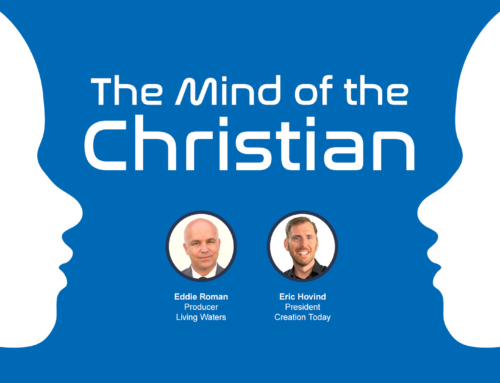My attitude to creation speaking suddenly changed with one short introduction. I was, at the time, a member of a rather small denomination in the UK, and my pastor had recommended me as a speaker to other pastors in the South Wales area where I lived. At one church where I had been invited to speak, the pastor stood up and introduced me in this way:
“This is Paul Taylor. He is a scientist, so you won’t understand a word, but I’m sure you’ll be blessed!”
Of course, he was teasing. Nevertheless, I decided to analyze whether or not the joshing had any factual basis. I decided that it did.
I have been speaking on Genesis, creation and evolution since my late teens. That means that I have been talking on the subject for more than 30 years. In common with many young people, I probably wanted to impress people at first with my science knowledge. I remember writing an article for my parish magazine, full of long scientific words and jargon. It certainly impressed people — a lot of people metaphorically patted me on the head to tell me how clever I was. This might have been a boost to my ego at the time, but it didn’t honor God. Nor did it affect people’s lives or thoughts.
You Can Do It!
As I grew older, my talks began to have less youthful arrogance, but were still packed with science. Some would comment that they were glad there were people around who understood the science. That may be the case, but it didn’t help the people concerned if they were unable to reproduce that science, when they were discussing the issues in their own conversations. I was building a structure, in which there was a strong implication that, in order to defend the Bible, one needed knowledge equivalent to a degree in science. Now, as a former schoolteacher, I am very keen on science education, and appreciate those who have studied it to God’s glory. But not every Christian is a scientist, nor should they be, yet every Christian is called to give an answer for the hope that they have (see 1 Peter 3:15).
Don’t Put God On Trial
Moreover, packing my talks with scientific evidence had an undesirable effect. If I attempted to offer evidence for believing the Bible, it actually put God and the Bible on trial. Basically, I was saying to an unbeliever “believe God because of the evidence.” This is actually the wrong approach. For about the last ten years, I have altered this position to “Believe God. Now you will understand how to interpret the evidence.”
People often talk about “hard evidence.” In fact, there isn’t such a thing as hard evidence. Evidence is something which is interpreted, and it is always interpreted in the light of a person’s worldview, or presupposition. Now we can focus on to something that the ordinary Christian in the pew can understand. Everyone has a presupposition. Many of the questions thrown at Christians to catch them off guard are presuppositional in nature. “You can’t believe that God created in six literal days. Science has disproven that!” You might be tempted to start with the scientific evidence that suggests a young earth in your reply — and the evidence is huge. But evidence is interpreted according to the presupposition. So it makes more sense to ensure that our own presupposition is secure and to challenge the presupposition of the skeptic.
Make It Easy to Understand
I praise God that there are many creationists, with PhDs, involved in extensive scientific research. They are pushing back the boundaries of knowledge and exercising the gifts to accomplish what God has called them to do. But that is not our calling at this ministry — and I would be so bold as to say that it is not the proper calling for most small creation ministries and speakers, unless you really are part of a team of PhD scientific researchers who are creationists. Small ministries and speakers attached to local churches are usually there to speak to non-scientists. They are there to speak to the ordinary Christian in the pew and to present the truth of the Gospel from the beginning of the Bible to unbelievers.
We’re Here to Help
For this reason, God Quest Ministries will be producing materials and suggestions to help people get started as creation speakers. Many people have contacted us, asking how they can get started in creation ministry. While there may not be a single answer, we want to encourage people to recognize the gifts and abilities that they have and not to fall into the sort of pitfalls that others, like myself, have done. We will be doing this through web articles, training courses and by producing training materials. We want to be able to share our experience and our methods, and to encourage new creation speakers to start with a thoroughly biblical background to their message and their methodology. So — watch this space!






